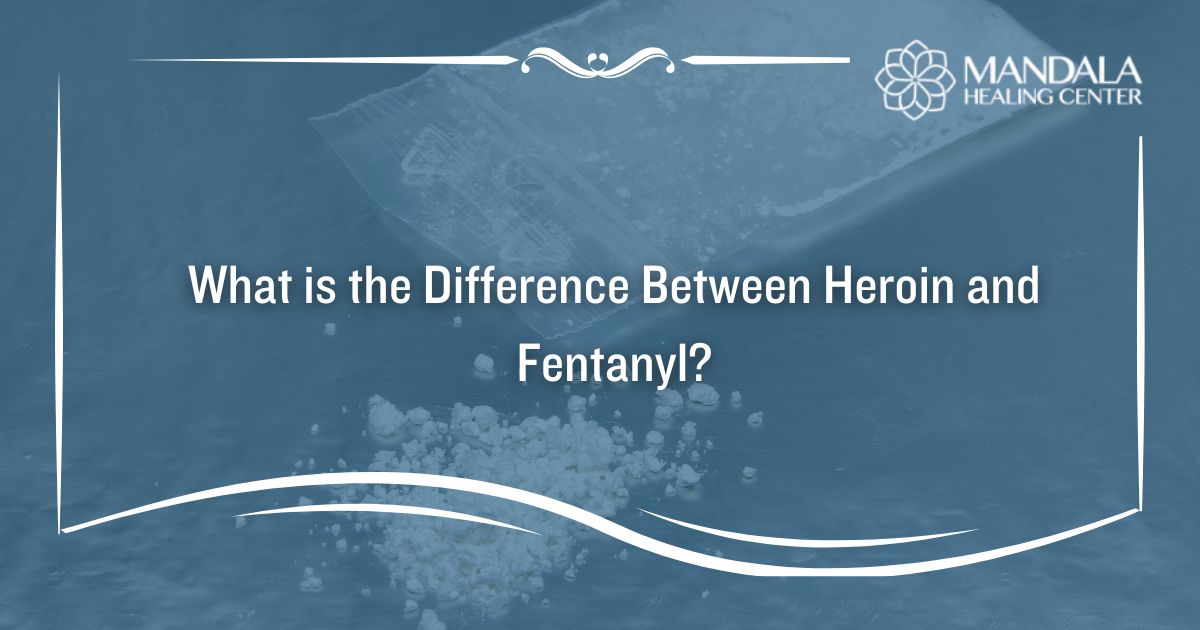The United States is currently experiencing an opioid crisis, with millions of people struggling with addiction and countless overdose deaths each year. The opioid crisis began with prescription opioids like oxycodone, progressed into a heroin epidemic, and then continued to increase in severity with synthetic opioids like fentanyl.
According to the Centers for Disease Control and Prevention (CDC), there were 81,806 opioid overdose deaths in 2022.[1]
If you or a loved one abuse opioids, you might be wondering what the differences are between heroin and fentanyl. While both drugs are dangerous, addictive, and lead to overdoses, there are some differences to be aware of. For example, fentanyl is used medicinally to treat pain, while heroin is an illegal substance.
In this article, you will learn:
- What is heroin
- What is fentanyl
- What are the differences between fentanyl and heroin
What is Heroin?
Heroin is an illegal opioid drug that is made from the poppy plant. This means it is considered a semi-synthetic opioid. Since it has no medicinal uses in the United States, it is classified as a Schedule I Drug.[2]
People abuse heroin because it causes feelings of pleasure, a rush of euphoria, calmness, dizziness, and drowsiness. It causes these symptoms by attaching to opioid receptors in your brain. While it can relieve pain, it is not used medicinally because of the high risk of abuse and addiction.
If you abuse heroin, you might smoke, snort, or inject it. Any form of heroin abuse is dangerous and can lead to life-threatening overdoses. According to the National Institute on Drug Abuse (NIDA), heroin was responsible for 5,871 overdose deaths in 2022.[3]
What is Fentanyl?
Fentanyl is a synthetic opioid that is 50 times stronger than heroin and 100 times more potent than morphine.[4] It is used medicinally as a prescription pain reliever for patients with severe or chronic pain. You might be prescribed fentanyl after surgery or to treat pain associated with conditions like cancer.
Unfortunately, fentanyl is often used as an adulterant in other drugs to increase profit by drug manufacturers and dealers. The fentanyl sold on the streets is created in illegal drug labs, giving it the nickname “illegally manufactured fentanyl” or IMF. Because of how many drug overdoses IMF has led to, it is considered a public health concern and a major player in the opioid epidemic.
According to NIDA, overdose deaths involving synthetic opioids like fentanyl rose to 73,838 in 2022.[3]
While most people consume fentanyl by accident, some individuals might abuse it intentionally. This usually occurs when a person develops a high tolerance for other opioid drugs like heroin, causing them to seek out more potent substances. Unfortunately, fentanyl addiction often leads to life-threatening or fatal overdoses.
Heroin vs Fentanyl: Understanding the Differences
Heroin and fentanyl can lead to life-threatening overdoses. Thankfully, there is an opioid reversal medication called naloxone available in nasal sprays and injections. Additionally, you can find fentanyl test strips to determine if your drugs have been tainted, preventing you from experiencing an overdose in the first place.
While these substances are both dangerous drugs of abuse, they have many differences for you to be aware of.
Potency
First, fentanyl is much more potent than heroin. While heroin is considered a strong opioid, fentanyl is 50 times more potent. In other words, smaller amounts of fentanyl can lead to an overdose.
Uses and Legality
Another thing to consider is the legality of both drugs. Heroin is an illegal drug that you can get in trouble for simply possessing. On the other hand, fentanyl is available by prescription and used to treat moderate to severe pain.
Type of Opioid
Lastly, heroin and fentanyl are different types of opioids. Heroin is derived from the poppy plant, making it semi-synthetic. Since fentanyl is completely synthesized in a lab using chemicals, it is a fully synthetic opioid.
Finding Help for Opioid Abuse and Addiction
If you or a loved one abuse opioids like heroin or fentanyl, it is time to seek professional help. Opioid abuse can quickly lead to life-threatening situations like overdoses and respiratory depression. Thankfully, attending a drug rehab center can prevent you from experiencing an overdose in the first place.
At the Mandala Healing Center, we offer all of the tools and support you need to overcome opioid addiction. You will have access to medical detox, medication-assisted treatment (MAT), evidence-based therapies, relapse prevention planning, and more.
Choosing a drug and alcohol detox can be difficult. We know Mandala will be the right fit for you. At Mandala, we are sensitive to the fact that every person we treat comes from a different background and has a unique set of needs. Our wide array of addiction treatment offerings allows us to cater to each patient’s strengths, finding the programs and activities that work best for each individual.
Contact us today for more information on our opioid addiction treatment center.
References:
- The Centers for Disease Control and Prevention (CDC): Drug Overdoses
- The Texas State Board of Pharmacy: Controlled Drugs
- The National Institute on Drug Abuse (NIDA): Drug Overdose Death Rates
- Texas Health and Human Services: Fentanyl: One Pill Kills












